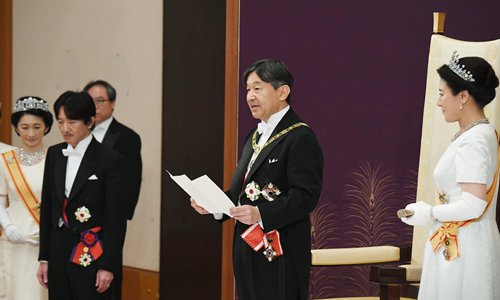HOME >> OPINION
Japan’s emperor has trust on his side
By Chen Yang Source:Global Times Published: 2019/10/21 19:48:40

Japanese new Emperor Naruhito ascended the throne on May 1. Photo: IC
Japanese Emperor Naruhito is scheduled to take part in ceremonies on Tuesday to mark his accession to the throne. Heads of states and representatives from nearly 200 countries and international organizations, including President Xi Jinping's special envoy and Vice President Wang Qishan, US Transportation Secretary Elaine Chao, South Korean Prime Minister Lee Nak-yon, and Britain's Prince Charles, are attending the event.
Emperor Naruhito's enthronement took place on May 1 and was attended mostly by Japanese people. This time, the ceremony is held mainly for the world at large. Which is the first country Emperor Naruhito will visit after the royal event? How will Japan's royal diplomacy look like during the Reiwa era? All this will undoubtedly attract worldwide attention and there will be an element of anticipation.
Activities of Japanese imperial family often attract public attention. But at this moment, imperial events have a special significance in the country - they can boost people's confidence and morale. Not long ago, Japan was hit by Typhoon Hagibis which left dozens dead, and caused shortage of water, food and electricity in many regions. The lives of tens of thousands of people have been affected. The royal ceremony can bring cheer to an otherwise gloomy atmosphere.
The ceremony is attended by dignitaries from nearly 200 countries, a leap from the 160 at the enthronement of former emperor Akihito on November 12, 1990.
Some people in Japan believe the increased number of participating countries shows Japan's growing international influence. But as far as I am concerned, it shows how the international community rates Hirohito and Akihito.
After Hirohito became the emperor of Japan, the country did make certain contributions to the world, but it also launched aggressions against other countries that brought disaster to parts of the globe. Thus, opinions differ on Hirohito.
But Akihito has been introspecting over the wars Japan launched, advocating peace, maintaining Japan's pacifist Constitution, refusing to visit the Yasukuni Shrine and being away from the country's right-wing forces. He has thus impressed the world and won worldwide acclaim and recognition from the international community.
That being said, heads of states and representatives from about 200 countries and international organizations attending Naruhito's ascension ceremony not only shows their eagerness to greet the new emperor, it is also a way to pay their respects to Akihito.
Akihito's Heisei era has come to an end. Will the core value of Heisei era's imperial diplomacy continue in the Reiwa era? Will Naruhito play the role of a peacenik and reflect on the wars Japan started? It is worth anticipating.
In fact, there is no such term called "imperial diplomacy" in Japan's royalty. It is against the spirit of Japan's Constitution and would make people think that royal family can be manipulated by other forces. But in reality, imperial diplomacy does play a significant role for Japan both at home and abroad.
For example, when Japan's right-wing forces emerged rapidly a few years ago and Japan continuously clamored over historic and territorial disputes, Akihito's remarks about his reflection on wars during his overseas visits to some extent restrained rightist voices. When Japanese Prime Minister Shinzo Abe attempted to revise Japan's pacifist Constitution, Akihito signaled that he would like to step down from the monarchy to show his dissatisfaction. The move made the country more cautious toward constitutional amendments.
Naruhito, who has studied abroad, once said that Japan should remember its wartime history correctly. This infuses people with more confidence in the country's imperial diplomacy during the Reiwa era.
The author is a media professional and a Japan watcher. opinion@globaltimes.com.cn
RELATED ARTICLES:
Posted in: ASIAN REVIEW